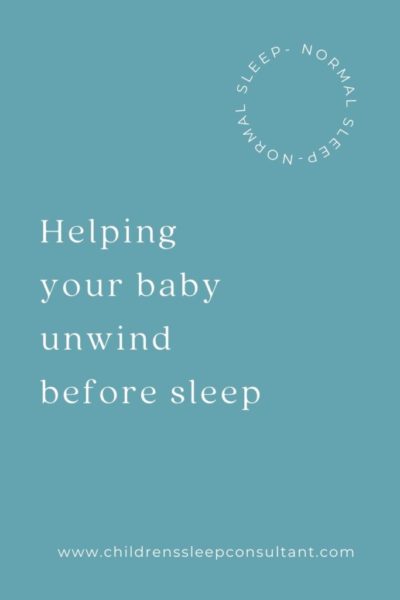Helping your baby unwind before sleep
Ask any parent, and they may well tell you that every day has its own ‘witching hour’. You know, that time where the kids seem to go a little crazy, time starts to drag endlessly, and hope of a restful time begin to disappear… This ‘witching hour’ tends to occur right at the worst time, too- just as you try to get started with dinner or when you need your child to settle down for sleep. Whether it’s before a nap or right before bedtime- sometimes that period just before the sleep routine begins is just hard work! This week we’re looking at why that might be and what we can do to help baby wind down before sleep.

Why do babies need a pre-sleep routine?
When parents ask me this question, I tend to ask them whether they themselves can just go upstairs, get into bed and fall asleep. Those who have suffered multiple sleepless nights tend to reply, ‘YES!’ almost immediately, but think about it. You have a bedtime routine that prepares your body and mind for sleep. You have a hot drink; you brush your teeth, you might read a book. You follow more or less the same steps each evening before you go to sleep, and this is your way of preparing yourself ready for the night ahead. Whether or not you get to sleep all night is another issue!
The point is that we humans are creatures of habit, and we cannot always fall asleep on cue when it’s bedtime. Babies are no different. A solid routine is a must if you want your child to sleep; preparing for sleep is so important so that your child’s body and brain can relax and wind down accordingly.
How to help baby wind down before sleep
We’ve spoken lots in previous posts about the importance of a good sleep time routine, whether it’s for a nap or for nighttime sleep. But this time, we’re talking about the time before the routine starts, as that’s often the hardest part of the day for some families. You might be busy making dinner, sorting other children- whatever it is. But as you’re doing that, your little one is getting ready for bed, becoming tired and cranky, and that’s when the potential for upset occurs. Here are three tips to stop the fussing and help baby wind down properly before sleep:
- Remove toys that play music or make sounds that are fast-paced or have the potential to disturb.
- Limit visual stimulation- dim the lights, remove screens and keep everything as low key as you can. No TV, no energetic games. The last thing you want is to get your baby’s energy levels spiking when you’re so close to bedtime.
- Engage your baby in quiet activities to help keep the atmosphere as calm and peaceful as possible. Soothing songs, gentle stories or even some baby massage are all great examples.
By helping baby to wind down before sleep, you’re signalling that bedtime is imminent and that it’s ok to start to relax and allow the brain to begin to slow down. An over-stimulated baby is likely to find it really hard to switch off for sleep when you start the bedtime routine, no matter how solid it is. And an over-stimulated baby quickly becomes an over-tired baby- and that’s where the trouble begins. Over-tired babies will find it hard not only to fall asleep but to stay asleep too. Do yourself- and your baby- a favour and turn your ‘witching hour’ into a wind-down hour instead.
If you have older children, this lovely unwind is not always possible. You can dim the lights and slow things down, but your toddler may have other ideas! Don’t worry if this is the case. If you can spend some time with your younger child hidden away before you begin your routine, then do. Maybe hang out with them in your room for 20 or 30 minutes before you get started on your night routine. If it’s not possible to leave your toddler for an extra 30 minutes (who knows what they’ll get up to!), you can have this unwind time whilst your toddler is eating their dinner, maybe whilst they’re watching a short show. Don’t feel that this needs to be perfect; good enough is good enough.

Want more help gently sleep training?
I’ve got you covered. Join the membership to access…

Gentle sleep training support
 Over 40 masterclasses, helping you with sleep changes and issues.
Over 40 masterclasses, helping you with sleep changes and issues.

Get all your questions answered in a live weekly Q & A.

+ so much more – 1 on 1 opportunities, bedtime meditations, downloads, all the help you could need.






